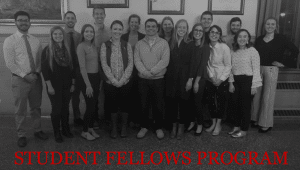
While visiting a breathtaking butterfly exhibit in the south, we saw two large rare butterflies, apparently mating. The interpreter, however, indicated that at this stage of their late adult lives, they were no longer fertile. One observer in our group asked, “Then why are they mating?” The interpreter replied, “Just for fun, I guess, just like the students at the local university.”
If there was any secret to the level of sexual shenanigans happening in our colleges and universities, the recent stories coming from Yale fraternity parties since the 1980s have removed all doubt. Our elite college and universities have a long history of being institutions of hedonistic binging. For an annual fee of only $50,000 (or $60,000 at some colleges), you can get a ticket to wild parties that combine sex, alcohol, and recreational drugs. Some students manage to get an education at the same time, but far too many sneak through with inflated grades or become part of the collective dropout rate at American colleges.
The sex binging in our culture (often with questionable levels of mutual consent) has become so pervasive that managers, news professionals, and celebrities are resigning (or being imprisoned) on a daily basis. The drug habits have become so universal that many companies have ceased employment drug testing, not being able to find enough applicants who can pass the tests. The evening news has become so graphic that Tom Wolfe’s “I Am Charlotte Simmons” feels like the normal American experience.
Dare I suggest that our culture has become a hedonistic environment in which we are more concerned about the worship of pleasure than we are in worshipping God, in contributing to the common good, or in investing in our future employability.
By contrast, there are still some adults who seek to invest in the next generation, wanting to know the best strategies for rearing a child who will become a positive contributing member of society. Research recently published by Ying Chen and Tyler VanderWeele suggest that attending church on a weekly basis is associated with greater life satisfaction, stronger character, lower probabilities of marijuana use, later sexual initiation, and fewer lifetime sexual partners. In addition to measuring church attendance, they also measured prayer and meditation behaviors, which yielded similar results.
This research project, conducted under the Department of Epidemiology and the Human Flourishing Program, both at Harvard University, measured thousands of children first as young teens and then with 8-14 years of follow-up data. The longitudinal design included statistical controls for sociodemographic characteristics, maternal health, and preexisting differences on the outcome variables of interest.
If the results were surprising, we would demand that the research be replicated by other researchers. In fact, however, the results are consistent with many other studies conducted over the last several decades.
Obviously, we don’t go to church primarily for the sake of promised health benefits. Nevertheless, the findings are compelling. Life satisfaction is higher for those who sit and listen to sermons about pleasing and obeying God than for those who do not attend church. The practice of religion appears to predict greater life satisfaction than the practice of engaging in wanton binging bashes of sex, alcohol, and drugs.
The students in my classes, at this small Christian college in Grove City, Pennsylvania, deal with all the same temptations that surround college students across the country. Nevertheless, there is a different culture here in which there is less social pressure to engage in the self-defeating binge behaviors. The data suggest that students attending here are more likely to actively engage in and benefit from a rigorous academic program than students who live for the three-day weekend binges.
We all ought to be burdened about the stories coming out about our public figures. We are now living in a culture with a broad consensus of worshipping hedonism. There is, however, another way to live, another way to rear our children, and this faith-based alternative predicts a higher life satisfaction. You (and your children) need to be in church this week.


